This online discussion is open for comments November 5-11. The assignment description and grading requirements are available here.
As with all aspects of music and music making, the economics of classical music vary from place to place and across historical periods. This discussion is an introduction to the trajectory of music history in the West (i.e., Europe and North America) for the few hundred years our course material covers. If any of this material is review for you, this in opportunity to incorporate a layer of music to your background knowledge! If you haven’t taken a history or economics course that covers these topics, use the embedded links throughout the blog post to fill in gaps in your understanding.
But, economics in a music class?
Economic factors—such as who has money, how much they have, how they spend it, and why they spend it—determine the way that music is made, what it sounds like, who listens to it, and the circumstances in which people experience music. They lurk behind all the various musical sounds we hear, and knowing a little bit of economic history can give our ears insight into the how and why behind much of the music we encounter.
There is no art without economics. Music, just as with the other arts, requires monetary support. This includes funding for obvious things like supplies (instruments and repairs, scores, paper, rehearsal space), education, and training costs. It also includes less obvious things such as some degree of financial comfort — without, for example, the stability of a warm home and food, a person is less likely to be able to devote time and energy towards making music because their attention is focused on fulfilling more basic needs. (This idea comes from Abraham Maslow’s 1943 article “A Theory of Human Motivation.”)
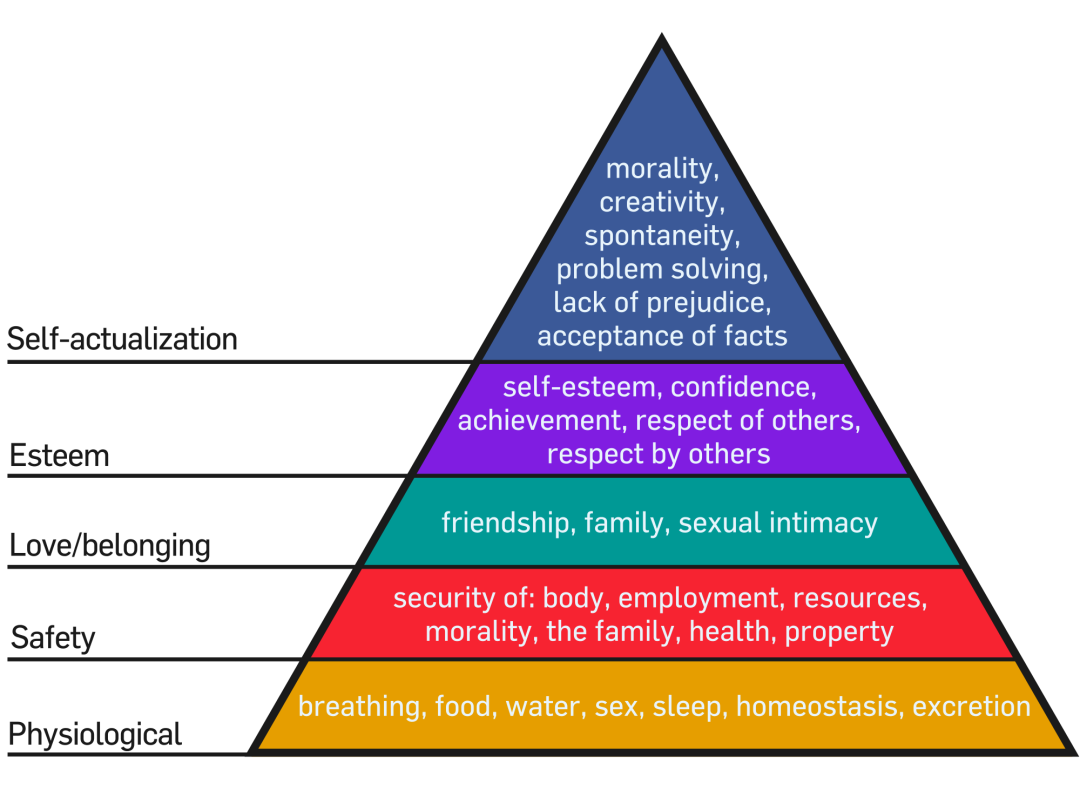
The patronage system
For most of the European continent’s history, the countries we think of as being “European” didn’t exist—e.g., France, Germany, Italy. Instead, the land was divided into multi-ethnic empires, city-states, and nomadic groups. Nations as we now know them were established in the late-18th and 19th centuries as a way to unify groups of people who shared a linguistic heritage and other common cultural features, along with geographic proximity. Kings existed, but they didn’t hold the real power (meaning wealth, military strength, or direct control of the land where food was produced); real power was wielded by aristocrats (noblemen with various titles: duke, viscount, baron, earl, lord, prince) or the Catholic Church.
And everyone else? The majority of the population consisted of peasants, and they worked in the fields generating the wealth of said aristocrats.

Part of the value of being wealthy and powerful is letting other people know that you’re wealthy and powerful. It creates a sense of respect, a healthy dose of fear, and a social class identity. One of the ways that the aristocracy and the Church were able to demonstrate their might was with the art that they commissioned, displayed, and controlled: they were the patrons of the arts, and the patronage system was the economic structure in which art was produced for these patrons. (A great background to the division of societies into people who produce food, rulers, and artisans/religious figures who consolidate those rulers’ power is the 1999 book Guns, Germs, and Steel by Jared Diamond).
Art (including music) wasn’t just a pleasant diversion or pastime under the patronage system—it was part of PR and image control for those in positions of power: a status symbol.
Architecture, for example, was used to demonstrate might and financial resources.


The visual arts captured a patron’s image for posterity. They often include not only sumptuous attire (rich fabrics, intense colors, and intricate details) but also depictions of music making, because it was believed by members of the noble classes that musical talent and musical taste proved how worthy a person was. (Remember, most noblemen and noblewomen learned to play an instrument as a hobby.)
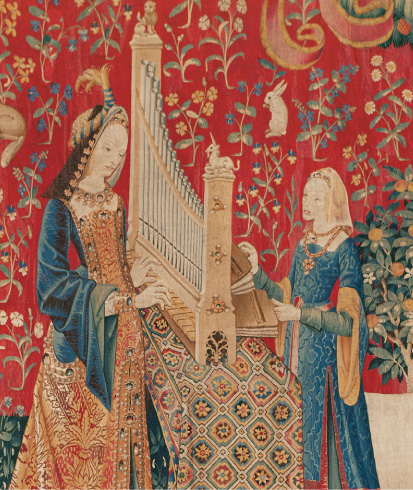
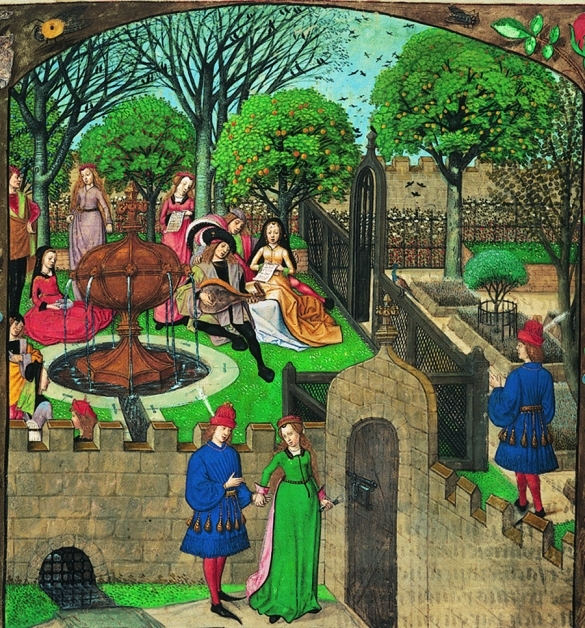
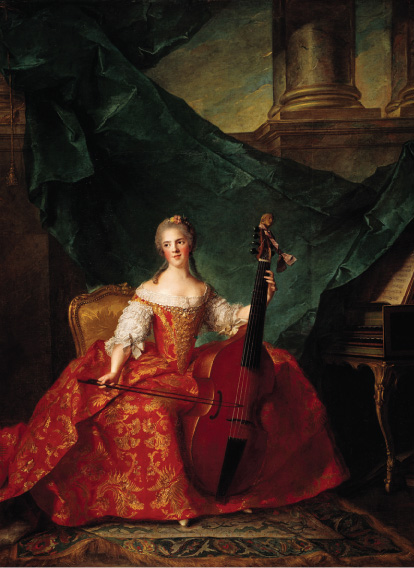
To be a musician under the patronage system meant to hold a job post at a patron’s center of power: a cathedral or an aristocratic court. This form of employment was a lifelong commitment, and a musician would earn a salary and also receive a uniform, be provided with supplies to make their art (staff paper, ink, instruments), and be housed and fed (including firewood for the winter). A musician’s duties were often extensive: a composer (with a job title like maestro di cappella in Italy, surintendant de musique or maître de musique in France, or Kapellmeister in Germany) would also be required to teach, perform, and oversee other subordinate musicians (hiring and firing). In return, the patron had final say on everything their employee did: travelling, permission to sell sheet music, and what music was made (more on that below). Johann Sebastian Bach’s contract with the town of Leipzig, where he was in charge of composing music, rehearsing music, and coordinating musicians for the town’s four churches was typical of the time: bach-duties-in-leipzig
It was also often in a patron’s best interest to allow their musicians to travel and publish sheet music—the fame and respectability of their employee would reflect positively on the patron and add more prestige to their reputation.
Economics, taste, and self-expression

Music written for a patron was designed to suit the needs or taste of the patron. If the patron loves the baryton (as Haydn’s patron did), a composer will write a lot of music for the baryton (Haydn wrote 72 trios for the instrument, even though no one else was doing it anywhere in the world). If a patron loves dance music (like King Louis XIV of France), then their composers and musicians need to be really good at creating and playing dance music. If a composer writes music their patron doesn’t like, the patron will tell them not to write like that any more, and that will be the end of that.
Something that you may find disconcerting or uncomfortable at this point is the realization that much music that exists in the world isn’t written for personal expression—it’s a job. The contour of a melody, the emotions conveyed by the harmony, or the instruments used aren’t necessarily an expression of the composer’s desires, just what he knew would keep him employed—they express the taste preferences of whoever was footing his bills. And that means the history of music is often a documentation of the taste of wealthy individuals—people with the means to commission and preserve the material culture of music.
The rise of nation states and shift to free-market capitalism
We don’t live in strict patronage system any longer, and that makes it seem like musicians are free to create whatever they music they want—they don’t have to please a king or aristocrat who is their lifelong employer. Bring on the self-expression!
Not so fast…
The shifting political-economic landscape in late-18th and 19th centuries simply means that music is now treated in a different way. The musician’s role in society becomes one of selling goods that the public may or may not buy—it still all comes back to economics!
Public taste is volatile (particularly when ideas are able to spread more and more quickly, as the Internet now allows), and this means that some musicians try to suit public taste (for example, commercial jingles, soundtracks, and pop music) while others simply make what they want to make, with complete disregard to whether or not consumers like it.
“The people who don’t want your music don’t change their minds. You outlive them, if you’re lucky.”
—Philip Glass, composer (b. 1937)
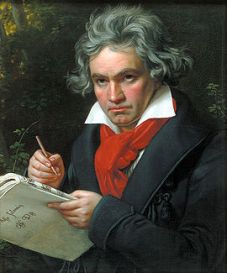
Ludwig van Beethoven (1770-1832) navigated this economic transition by using both the patronage system and the emerging capitalist markets to his advantage. He threatened three Viennese aristocrats (who loved his music and loved having him in their city) with a job offer he had received to join a court outside of Vienna. Under fear of losing him, these aristocrats caved to his threat and agreed to pay him a healthy annual subsidy to remain in the city with no other strings attached. Beethoven also shrewdly published his music simultaneously in multiple countries at once—there was no such thing as copyright law at this point, so if Beethoven had sold his work to an Austrian publisher, for example, there was nothing stopping a French publisher from copying it and selling it themselves. Beethoven’s business acumen beat them to the punch and took advantage of the fact that he was well-known across Europe, with consumers everywhere clamoring for his music.
 Pianist Clara Schumann (1819-96) was able to support her family of 8 children and her mentally ill husband, the composer Robert Schumann (who is the first person who’ll come up if you Google “Schumann”—not Clara) through her rigorous touring schedule. She performed widely and to great acclaim across Europe right up until her death, and this was how she navigated the free market.
Pianist Clara Schumann (1819-96) was able to support her family of 8 children and her mentally ill husband, the composer Robert Schumann (who is the first person who’ll come up if you Google “Schumann”—not Clara) through her rigorous touring schedule. She performed widely and to great acclaim across Europe right up until her death, and this was how she navigated the free market.

Musicians today: the gig economy
An ideal situation for many modern musicians is holding a steady position with either an orchestra (as a performer or conductor) or a university or conservatory (teaching composition, performance, music theory, music history, or some combination of those subjects). The best jobs in these fields pay quite well, but there aren’t very many opportunities to go around. The next few paragraphs deal with orchestral performers, but the same issues are true for composers and professorships.
In class we read a 2012 article (dorris-the-audition) that described the lengthy, exhausting process of preparing for orchestral auditions: how much time it takes, what a player does to prepare, how they earn a living while trying to win a job, what happens after they win a job, how few jobs there are, and how much money orchestral musicians make. It is an easy read and features Mike Tetrault, an orchestral percussionist.
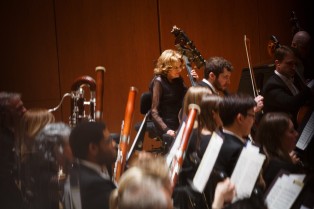
Musicians in the top US orchestras earn around $100,000 per year (depending on where the orchestra is located; players in Alabama earn less than those in Chicago, for example), and that shows how valuable and rare high quality orchestral playing skills are. There are very few top orchestras, however, and there are only 20 orchestras in the US whose average salaries are over $55,000 per year.
Demand for these jobs is high. There are 117 symphony orchestras in the US. That means there are approximately 11,700 orchestral job positions in the US, assuming each orchestra has 100 players, which is an over-estimate. But that’s not the same as saying there are 11,700 job openings there are every year, because once someone wins a good orchestral job, they hold onto it for 30-40 years. For flute players, for example, there were only 4 job openings in the US in all of 2015-16.
There are approximately 60 college-level music schools or conservatories in the US, and they typically train musicians to enter a specialized career trajectory of being an orchestral player or opera singer. Each school will graduate a class of around 150 students each year —that’s 9,000 students every year.
Add all those graduating students to the musicians who haven’t won an orchestral job yet (say, 8,975 from every previous year), plus international musicians…
Uh-oh.
Instead of holding a single, steady job, the typical modern musician’s career is a prime example of the gig economy: cobbling together a living wage from several small revenue streams, none of which is sufficient on its own, none of which provides benefits like health insurance or retirement savings, and none of which is guaranteed to continue.
- Concerts— Musicians may be paid by a venue or concert series for their appearance, they may take home ticket sales, or their performance may be organized by a management company. A concert payment for a musician can range from $0 to $4,000, but most concert performances pay $100-750 per player. This also includes many orchestral jobs outside of the top orchestras, which are paid “per service” rather than a salary (around $40 per rehearsal and $150 per performance).
- Commissions— Composers charge commissioning fees when someone asks them to write a work. Rates depend on the length of the piece (longer = more expensive), the number of musicians (more musicians = more expensive), and how famous the composer is (more famous = more expensive). The commission fee may range from $2,000 to $100,000, depending on these factors. Often, groups of performers will form a consortium to commission a work and divide cost among all members, so that no single player has to bear the weight of the entire expensive commission themselves.
- Teaching private lessons— A musician recruits students to take individual lessons (in performance, conducting, or composition), finds space to teach in, prepares lessons for each student’s individual needs and desires, keeps students and parents happy, and organizes performance opportunities for their students. The cost of a one-hour lesson varies based on geography and teacher: $15 (in Texas and the Midwest), $60-75 (typical in NYC), $250 (for lessons with the most famous teachers in NYC).
- Teaching in community music schools— All the work of recruitment and infrastructure (and sometimes curriculum) is taken care of by the school rather than the teacher, but the teacher earns less per hour (in NYC students pay around $70, but much of it goes to the school itself and the teacher takes home around $40). There are several such schools in NYC: Brooklyn Conservatory of Music, Lucy Moses School at the Kaufman Center, Bloomingdale School of Music, Third Street Music School, and Turtle Bay Music School.
- Teaching primary education— This includes band directors, orchestra directors, and choir directors in elementary, middle, and high schools. The average NYC public school music teacher makes around $50,000 per year.
- Teaching secondary education— Most college and university instructors teach at more than one campus, and most positions are adjunct (hired just for that class or semester with no guarantee of being rehired). Some schools pay only $1,500 for a semester-long class; CUNY schools (depending on the highest degree a teacher has earned) pay up to $4,000 per class per semester (this page gives adjunct salaries by the hour).
- Grant writing — There are several foundations and government organizations that support the arts and music making, and they award money (ranging from a couple hundred dollars to millions of dollars, depending on the organization) for the creation and public sharing of artistic work via a competitive application process. Here’s a taste of what grant writing is all about.
It takes a lot of these activities to add up to a living wage, and booking one gig doesn’t guarantee that there will be more work in the future. Many musicians work “day jobs” that allow them to practice, rehearse, and gig at night: dog walker, yoga instructor, grant writer, administrative assistant, baby sitter, paralegal, plumber, or insurance salesman. Sometimes these day jobs take over, and a musician stops being a musician entirely.
Online streaming: the promised land!
You may have noticed that I left out online streaming as a source of revenue for the average classical musician working today. That’s because it typically doesn’t pay well for anyone, regardless of their musical style—the average pay is $0.0025 per play—less than a penny.
When musician’s recordings are played on various digital platforms, we as consumers generally pay little or nothing for the experience. YouTube, Spotify, and Pandora all include advertising on their basic levels of service (free for the consumer); it seems like artists are probably compensated for their work through ad revenue and that popular artists make significant money for their efforts because so many people are listening to their music. However, these business models pay musicians very little: Spotify pays between $0.006 to $0.0084 per play; Pandora pays either $0.0014 (non-subscribers) or $0.0025 (subscribers) per play—and depending on an artist’s contract with their record label, they’ll receive only around 40% of that money. The songwriter for “All About that Bass,” sung by Meghan Trainor, is Kevin Kadish. The song was unequivocally popular in 2014 and was played 178 million times on Pandora, but for this Kadish received a check for $5,679; another songwriter whose work was played just over one million times was paid $16.89. The less-popular but still successful band La Roux earns approximately £100 for three months of streaming. Taylor Swift doesn’t include her music in Spotify’s streaming catalogue for this very reason—it devalues the art:
“Music is art, and art is important and rare. Important, rare things are valuable. Valuable things should be paid for. It’s my opinion that music should not be free.”
It’s also worth noting that Swift is in a position of considerable privilege—she can reject the means by which less-established or less well-known artists connect with new listeners because she is already successful and also because she makes money via other avenues, such as ticket sales for her live shows.
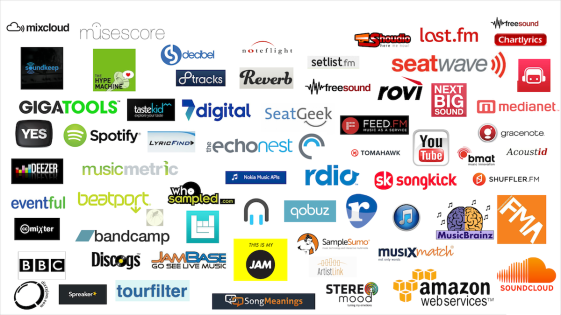
The irony of recorded music being ubiquitous in our lives (meaning that we can’t imagine our daily activities without it and that we prize its perfection) is that it seems we value it less than ever.
Final thoughts
Making music is more complicated than just being inspired and sharing sounds with the world. Oftentimes the most financially successful musicians aren’t necessarily the most talented, the most interesting, or the most artistic—they’re the ones whose skills (musical and business skills) aligned with the economic demands of the time and place in which they live. The music we’re left with over time is the music that was created in courts and churches that had the means to fund and preserve copies of sheet music over several centuries (not necessarily the best music), and the music we come across on the radio or digital media is often also the result of a musician being aligned with record companies, management, or promoters who have the economic clout to ensure that their music is heard—again, not necessarily the best musicians.
-Dr. J.

Making music is definitely more difficult than it seems. People believe that it just comes from your feelings and emotions(which is true) but there’s much more to it than that. You need money in order to create art. You need money for everything in this world. Just because you have money doesn’t mean you’re the best musician out there, you’re just able to get your name and label out there to the rest of the world. But if you don’t have any money, it doesn’t mean you can’t be the best, you just need to work for it harder. There are only certain people who are able to have their musical and business skills aligned with their economic needs and it just makes everything easier for them. But that doesn’t mean that you’re unable to achieve your musical career if you don’t have either. Keep pushing and you’ll find yourself where you want to be. People like the Kardashian’s just didn’t stop, they kept pushing creating and promoting their TV show, Kylie Cosmetics, etc.
LikeLiked by 2 people
I agree music is not that easy to make it took a lot of effort in order to make things right or make it good as they can. We as listeners, it seems easy for us as an audience but there is a complete procedure bind it.
LikeLike
absolutely, there are many things that comes into play when it comes to making music. Alot of people dont understand that.
LikeLike
After reading music and economics, the music industry is harder then I or any person would think of. Having money doesn’t indicate your better then others, or if your in the music industry in this case money isn’t the priority. I believe if you just work harder every day, and you put your mind and heart to it, you can achieve anything. That goes for everything. I agree with you raphaelirizarry, yes you need money for everything but that just makes you more noticeable to the public, but that doesn’t mean to stop your dreams.
LikeLike
I agree and understand with what your saying. Money is a factor in the music business because surely everything does require money. But for the individuals who aren’t rich, it makes the individuals have to work even harder and spend more time on music because it’s basically their life. Like it said in the reading, music for the higher class like the nobles was considered a “hobby” but for the other less money making individuals it’s their job/career. It’s basically their whole life’s on line because there doing what they love.
LikeLike
I agree with your idea that money do not stop your dreams, because we all know about at least one case where this one person, became what he/she always want to be, with effort and enthusiasm. Also that money do not make you better than others, because we all equal.
LikeLike
After reading the article, especially where the article mentioned “the history of music is often a documentation of the taste of wealthy individuals”, I thought of the article, “Music in the western world”, that I read for the presentation was done today in class. The critique in the “Music in the western world” was based on how rich people ruled the music of the taste and the rich people only focuses on the musical technique rather than the interacting emotions throughout the music. Government also controlled the composers to write a music for the working-class people which is known as folk music. After reading this article, I thought of why most of parents in my country (South Korea) don’t like their children to study music because getting job in this field is so competitive. On top of that, classical musicians make about “$0.0025 per play” which is very low to live a comfortable life.
LikeLiked by 1 person
Music is also a business and it seems you need money become success in that career also it is a career that can gain you a lot of money and power for instance Beethoven. He threatened three Viennese aristocrats who loved his music and loved having him in their city with a job offer he had received to join a court outside of Vienna. Under fear of losing him, these aristocrats caved to his threat and agreed to pay him a healthy annual subsidy to remain in the city with no other strings attached. So if you have money to expand your music it could gain you more money if not then you get the regular pay $0.025 to live a lousy life.
LikeLike
So, this read was very very insightful. It’s true that we take music as art for granted. For me, I use Apple Music and it’s nothing what I pay for the service and now that I think about it, it’s probably not much being given to the artist (of course considering how the profits get split up.) Apple is probably getting paid more than the artist. I agree with Taylor Swift how streaming music devalues the artistry of a musician, even though I’d hate to lose the privilege of being able to do so. At the end of the day, art is valuable and if it’s really good stuff, it should come with a price tag. This is the livelihood of people and how they essentially survive. This is one of the reasons why I had a change of heart last year and decided to pursue business and finance instead of vocal performance. I didn’t think that studying voice was a practical decision considering that I wasn’t so sure how it would pay my bills after getting my degree.
Abraham Maslow’s hierarchy of needs was especially interesting how it prioritizes the things we need to be more productive and live a fuller life. It was definitely eye opening that it really does come down to that order when it comes to living our “best life”.
As for the patronage system, there’s still many similarities to how record labels and artists work together today. The label has the final say in many aspects as how the artist will be promoted in the market, where and when they will tour, who gets paid and how much, also what music will be put out. Both systems or relationships want to generate more revenue and profits, so it is understandable that some strategies take place to increase that.
One thing I dislike learning from this post was that Clara Schumann doesn’t receive the credit she deserves for her extensive line of work in touring and performing while her husband is the person that takes the credit for the “Schumann legacy”. Most of their work was done by Clara anyway, so Google needs to adjust their list of results ASAP.
Finally, I’m glad that there are some artists that put on a great, full show and don’t just resort to streaming and album sales. In this digital age, artists need to not just rely on downloads and
in-store album purchases. I appreciate artists like Lady Gaga, Beyoncé and Taylor Swift that after being great artists, they are real business women too. They may charge a pretty penny for their shows, but they are worth the cost. They put on an amazing show and that really brings up the value of their art.
Can you guys imagine if there was a Virtual Reality Tour by your favorite artist and being able to be home and experience that concert and being practically front row? Also, do you agree with Taylor Swift and that music shouldn’t be free? Last, how much do you think that artists should get paid for a stream? I’m curious to know what you guys think!
LikeLiked by 1 person
Unfortunately, money has a lot to do with being successful anywhere. I believe success also has to do with how you “play the game”. I think some of the most genuine people have difficulties with success if they feel the need to speak their minds or refuse to do something that goes against their beliefs. An example being Julius Eastman. And like we mentioned in class, he was not very successful or well known because of his issues with money and success. It seemed there was more discussions about him after his death. A lot of stories about music business also depict the managers Discussing whether or not a musical group has “the look” or not. I think success has many different contributing factors.
LikeLiked by 1 person
absolutely. A certain finesse or charisma is needed
LikeLike
The history of the job of a musician has changed greatly. Being a respected musician before meant that you were under an aristocrat’s household and you performed professionally. This was thought to mean that you were worthy because of your talent and that was greatly appreciated back then. Now the job of being a musician distaste me because of not well pay in this generation. It was crazy seeing how limited the job availability for professional musicians are, I feel like talent should be paid a lot more than the .0025 on average earned a play online. I feel that the respect and livelihood for music appreciation has dropped immensely and these days everyone is focused on the profits from music not the money going into creating it. Talented respected artist should be paid more on a steady professional level and not on a “gig economy” style.
LikeLiked by 3 people
I agree and also people, people in these days everybody wants to be a musician the place for good singers also decreases and they will not be able to be in the position which they deserve and has a lot of talent. Money in one way is also is that they choose those musicians or singers who has money. Any person in this world where ever they go either for interview they will see your dressing first they don’t see your talent first and if people are poor and have talent that will make problems for them
LikeLike
I think the shift from the patronage system to free market capitalism was really good. It restructured music from being something that just the upper class enjoyed into something that everyone can participate in. Musicians are now able to freely express their feelings and use their music as a source of pleasure and enjoyment as opposed to just doing it as a job. More people are also able to enjoy music for what it is, and for the emotional, phsiological, social and other benefits that derives from it.
LikeLike
“There’s no art without economics” That’s very true! I’ve always known that music cost a lot to create. As a result, I automatically thought … well since it cost so much, then obviously the people involved must be making a lot more. That was my theory, but it seems like my assumptions are dead wrong. From the reading, I was able to assess that some musicians don’t make a lot of money. Also, working in the musical field is hard work – which takes a lot of effort, planning and administrative work to make that little theory of mine come through. If proper execution is not done or musicians have no sort of links to people who can promote their work, then the money’s not going to run. There’s much more economics to it than I thought; a great part of it involves the economic barriers and challenges musicians face.
1. Firstly, funding! Getting funding can be a hard thing, especially when you’re not as popular in the music business. No one wants to sponsor new artists and musicians. The bigger guns quicker get funding than the ones just trying to make it on scene. That’s bad because if you cannot get funding to help create good music or to promote it, then it’s going to be harder to succeed. How are you going to reach that level of making great music? It’s sort of like saying you need experience to get a job, but how do you get experience if you don’t have the job to practice? Speaking from experience, I was apart of a new and upcoming steel pan orchestra and it was very hard to get sponsor for the band. All the top bands had big sponsors from Banks, hotels and so and no one was willing to sponsor the little band that much people didn’t know about. This made it very challenging for us to support the band’s needs.
2. Musicians also have to ensure that they establish a good fan base and they continue to produce good music that the fans will appreciate and support. If you lose fans you lose money.
3. With orchestras being so competitive to get into, musicians are forced to find alternative ways to generate income. Concerts for e.g. With this, they run the risk of people not showing up. If that’s the case then they make no money from the show. Or in other instances musicians may have to deal with their gigs getting cancelled last minute.
4. Artists may also have trouble with getting paid royalties.
LikeLiked by 2 people
I read an article on Rolling Stone entitled “The New Economics of the Music Industry” which speaks on how artistes nowadays make money in the music industry – or do they really make any money at all? It’s basically saying that the music economy has changed drastically due to the advent of online streaming platforms which results in artistes making less money than they used to in the past, from the sale of CDs for instance. It sort of gives an idea of the amount of money an artiste/songwriter ends up with after retailers and record labels take their share of the sales. Now, I really see that online streaming impacts artistes/musicians income in a negative way. https://www.rollingstone.com/music/music-news/the-new-economics-of-the-music-industry-234924/
LikeLiked by 1 person
Music is definitely a business, in a highly competitive market. I’m actually shook about how much online streaming such as Spotify, apple music… pay the artists. its has cons but it definitely has some pros. One of my friend who is an artist told me that it allows artists an easy way to provide samples of their music to customers with the hope that they will like the music and purchase other songs or albums. It is also a better alternative to having their music illegally downloaded via torrents and websites. Spotify is definitely not a money maker for them. Not even close. The exposure is great and it allows them to create whatever they want, and share it with the world. The streaming has become an excellent promotional vector, especially for beginners, freelancers or self-produced. Author, composer, performer and producer.
LikeLiked by 1 person
Questions: why does streaming online pay artist so little ? And also are they economically fair to musicians ?
LikeLiked by 2 people
@elisendiaye Not sure but I think online streaming doesn’t pay so much because of the fact that the music becomes readily available and easily accessible to everyone. This, then diminishes the value of the music. If something is available everywhere, then it’s not of much value after all! Most people may not bother to buy a music album if the songs can be heard on YouTube for free!
LikeLiked by 3 people
t think that they get paid so little because that’s the only way you can listen to their music and it also open to everyone and its easy access. I agree with Jenelle when she say “if something is available to everyone, then it’s not of much value” because it’s like I don’t need to waste my money and buy something when I can easily get it someone online.
LikeLike
@elisendiaye The way the industry sees it I guess is they are providing the means to get the music across, their name alone gives them exposure.
LikeLike
I believe that streaming services that pay little because they believe that the songs are going to get a lot of plays, so they artist are going to get their money worth. I believe that they should get more money for each play, but not more than 2.00$, actually depending on the popularity of the artist. If the artist is more popular than they should get a little less because they are guaranteed into getting plays.
LikeLike
do you believe that artists are being paid the amount they deserve?
LikeLike
Music and money have always stood ground in determining how successful a music artist can potentially be. However this is relatively true in most cases. Within these situations, money is the main factor in establishing the type of exposure the artist could have and how widely reached their content will be. As society and trends shift time after time, artisits have found methods in reaching success not only with money however. Although artists in the modern world expose their names through various online platforms, networking, collaborations and other ways, money still plays a major role tied into determining who gets far and who doesn’t. For example a band notices that mainstream music is a certain genre that is not part of their sound whatsoever. Although this band is justified in doing what they like, most people would say their not making as much money as artists who are playing what is increasingly popular and trending. It’s unfortunate the way the music industry works and how its a business revolving around millions of dollars. However it is always interesting hearing the way music evolves and changes over time.
LikeLike
“Music is art, and art is important and rare. Important, rare things are valuable. Valuable things should be paid for. It’s my opinion that music should not be free.” This is a quote I truly believe in and completely agree with. It has now come to my understanding as to why a majority of music artists charge for their music. Whether it may be of concerts, charging for downloads, or simply purchasing an album, music artists deserve every last dollar they can obtain, simply because of the process in which it is made and produced. It is important to recognize all of the work it takes into making music, and one must simply learn to appreciate the efforts that an individual must undergo into creating music and the struggle it takes to make that first piece and clenching along the process through the ups and downs into hoping that they succeed. Although success is a key factor, if the funds are not available for the time, it becomes stressful for a artist which would cause them to go astray and sometimes never follow up into finishing what they started. In conclusion, artists must be appreciated enough into getting what they deserve for the magnificent pieces of music they create which benefits society in its many ways.
LikeLike
I agree with your comment music is valuable because not everyone us blessed with a natural soothing voice therefore it is valuable. Music itself is valuable because it’s something that everyone relates to and it brings people together regardless of their differences.
LikeLike
I agree with your comment music is valuable because not everyone us blessed with a natural soothing voice therefore it is valuable. Music itself is valuable because it’s something that everyone relates to and it brings people together regardless of their differences. Music shouldn’t be free I believe as well because artists put so much of their time and effort into it. They should deserve to make their albums not free. Since its easily accessible on YouTube and spotify people don’t bother purchasing it.
LikeLike
Money takes up an important place in the music industry. Do you think that the amount of money you make depends on the kind of music you perform in today’s world?
LikeLiked by 1 person
I believe that the amount of money you make do depends on what music you perform because the music has to be played well and it has to be a popular genre.
LikeLike
I believe so because one kind of music may perform better than another kind, and the one that performs better may draw in a bigger crowd so in turn the artist would get payed more to stay on board.
LikeLike
I believe that society will always follow the rule of supply and demand. Whatever vibe us as the people feel whether it be trap and tnb or whatever, most artist will change their sound possibly to bring in bank.
LikeLike
depends on what aspect, if you mean the way that an artist comes up then yes. The amount of money that an artist makes doesn’t mean that they are in a defined genre of music. For example, there are many metal and rock artist that have and still make a ton of money because of the art they do and do not flash it. on the other hand, rap and hip-hop artists tend to have a lot of money, at least the mainstream ones and DO flash it.
LikeLike
This article enlightens me on the struggle musicians face financially. I am sure there are more folks out there who don’t know how much hours and energy it takes to have a piece of music written or produced. Every single person who values hard work should really show more appreciation to theirs.
LikeLike
As someone who went from purchasing Physical albums…to illegally downloading music…to paying for a streaming service this reading showed the fluctuation of the economic value of music and as a consumer makes me feel somewhat guilty. It reminded me of why jay-z purchased tidal http://fortune.com/2015/03/31/jay-z-tidal/.
LikeLiked by 1 person
It also reminded of me of how Most artists Make their money while still maintaining a music career… a lot of them make outside investments that have nothing to do with music at all, for example, Rick Ross owning several “wing stop” franchises. But they make the lump some of their money by Touring. https://www.rollingstone.com/music/music-features/how-musicians-make-money-or-dont-at-all-in-2018-706745/
LikeLiked by 1 person
I’m not surprised at all by the fact that art is used to display power. IF you walk into a upper-class home you will definitely see pieces of artwork at display and they may not necessarily be famous works of art because those are mostly held at museums for their invaluable price, but you might see expensive artworks or artworks done by expensive artists! Like the examples of architecture provided in this article, I remember reading about the Palace of Versailles that was built under the commission of King Louis the XIV. He used that to portray his power and many others from different countries followed this example. In the palace, there was a place called The Hall of Mirrors that was specifically built for showing off his luxury. Although, the king was going broke at the time, he made sure it didn’t look like that from the outside. In the room there would be musicians always holding concerts and later, during wars with Britain and Germany, that room had been destroyed or occupied several times to show a seize of power and dignity.
LikeLiked by 1 person
I think so music is not always about money, money can’t bye your talent. I have seen two poor sisters they both were homeless and they sing songs in the streets somehow media come to know about the sisters and they took them and make their videos, they put those in social media and a lot of people now know them. We can say if people don’t have opportunities when they are poor this is right but no body can steel your hidden talent.
LikeLike
After reading music and economics, the music industry is harder then I imagine, just because you have money doesn’t make you the better musician. I understand that money is important but time and practice make the musician play incredible.
LikeLike
Although I agree with your statement that its the time and practice one puts into their craft that makes them great, I also feel like no matter how talented you are, and no matter your field or craft, you need money to support your career. Being an artist myself, I remember while interning for SONY records, an A&R asked me did I want some inside-knowledge on the business. After responding yes, he asked me what it is that I think it takes to make it in this music industry. I told him It takes hard work. He said although it takes a lot of hard work, it aslo takes a lot of money. At first I didn’t understand, but after being around the business for a little longer, I started to notice how expensive it was. I also started to realize that a lot of the big records we hear and love today, didn’t become successful because of the artist’s talent, but the artist’s Money that was behind the record itself.
LikeLiked by 1 person
I believe that economics have always had a hand in the creation of music whether it was the climate a piece was released in or the economic background of the composer/artist. I feel like the ways that a musician can make money have been expanded on but also restricted. Clearly with the rise of the internet a whole new avenue has been opened up but soon the complete death of the original means of conveying music will come. This is because they are no longer viable from an economic standpoint. While concerts are still are still relatively popular, things like CDs have become a thing of the past. My whole point here is that music is what drives everything nowadays and the world will adapt to accommodate this norm.
LikeLike
Making music is definitely more difficult than it seems, especially if you need it by a deadline. I have seen my pan arranger struggle to get the perfect phrase down especially under the pressure of having to have a 10 min song done by the ending of August. Economics plays a big part in the music industry, such as the composers economic backgrounds. This article also shows that it doesn’t matter how much money you earn its all about the practice you put into your work and how much you want something.
LikeLike
From this weeks reading , this goes to show you that musicians have spent time,energy,and a lot of money investing in their music careers . Although some of them have succeeded, the majority of these musicians do not. You have to have the money, time, energy, and the connections to build a successful music career.
LikeLike
I agree, money is needed to fund your dreams. Working in the service industry, I always speak to my coworkers who are musicians and they always tell me they work multiple jobs in addition to music because an additional income is needed in order to continue pursuing their dreams and goals.
LikeLiked by 1 person
I agree with this Article so much because interning at this record label I was able to see how artist sometimes get percentages of the music the make like, publishing, music sales, merchandise sales and etc. Though if the artist got assistance by the record label and signed the proper contracts, record labels are then able to take out percentages of the money that they make. Also the article talking about artist making there money mainly from live performances. Though through streaming they don’t receive as much as per listener. I find this interesting also because after the reading I seen a connection between the Record Labels, Artist, Consumer and the king, Artist relationship. I wonder how others feel about this.
LikeLiked by 1 person
I do agree with this article after reading, I realized a lot of things money does play a big part in the music industry, musicians have to keep themselves busy and I didn’t know they were so many music job opportunities. If you don’t put yourself out there you will never get the opportunity to make money. Musicians have to work really hard. I would like to know how can a musician that’s low key make it without being out there in the lime light?
LikeLike
Working in my internship I am a mixing assist so I set up mixes, software, record and assist mix and master tracks. Thinking about economics in music us mixing engineers just had a law passed for us to now receive percentages on the music sales because they are carnation to the process as well. I think this is something big because before mixing and mastering audio engineers were only one time compensated now engineers are able to receive more. Though only I believe a 20% It gives the chance for a engineer to sustain a more economic successful career in this ever-evolving industry.
LikeLike
People with money have more advantages in the music business because they may come from parents who are musicians themselves. Those are the people that have an easier way to make a song and be able to put it out. But for people with no money it’s a little bit harder because they have to find money any way they can in order to go to a studio and record a song. For example, Miley Cyrus grew up with a father who was a famous country singer and later on she became a singer and actress. As for Jaden Smith(actor/raper), Willow Smith(singer) and Trey Smith(DJ), they also grew up with a dad who is a famous actor from the Fresh Prince of Bel Air and many more movies. But for rappers like 50 Cent, Tupac, Biggie Smalls, Logic, Lil Tjay, and Aboogie didn’t grow up with parents who were famous or grew up in the best of neighborhoods. 50 Cent was born in South Jamaica, Queens, NY and his mother was murdered when he was eight years old. As for Tupac he grew up moving back and forth between Brooklyn and the Bronx and witnessing his mom struggling with substance abuse. Biggie Smalls grew up in Clinton Hill, a then- derelict neighborhood in Brooklyn with a mom who took care of him alone on her teacher salary. Logic grew up in Maryland with a father who had a cocaine addiction and a mother who suffered from alcoholism. Lil Tjay is from the boogie down Bronx in Ny where young kids are in gangs, get killed before their life have begun and get arrested for selling marijuana in the streets. As for Aboogie he comes from Highbridge in the Bronx, Ny were he has been arrested in the passed for selling marijuana in the streets but also where people sell drugs. So as we can see people with money have a better life because they live in fancy houses and don’t struggle. As for us that live in the project houses, we struggle everyday finding ways to make our dreams come true.
LikeLiked by 1 person
Do you consider that people with no money should be given the opportunity to pursue they dream no matter their pass?
LikeLike
Of course, having insufficient funds to make music could be a burden, but it shouldn’t stop an artist from trying to pursue their goals. Soundcloud is a great free platform for young upcoming artists. Artists such as Lil Uzi Vert, Chance the Rapper , and Jay Critch all have had success through the app.
LikeLike
when I read this article, my perspective from money and music was way different than I thought, knowing that before being a composer and a performer it wasn’t all about money, that working and being able to sell their pieces was decision from their patron, and most of the time they were able to do it, because was good for them, as the reader say. A great example that we can relate to this reading is Franz Schubert, that used to stay on his friends house in change of music. but I got question, do this situations were this good as Schubert situation? and how much do composers and performers used to get pay?
LikeLike
With the constant shifting of the music industry affects everyone who works within the industry. The way we listen to music will always change and so will the business. Streaming music is how we mainly listen to music in today’s society and thus everyone is listening to many creators, but even as the music spreads, most creators are in a sense being cheated because they’re not being rewarded fairly, even when they put in just as much work as any other artist.
LikeLike
After reading this article, hard to describe my complex feelings, sad, ugly true, touch my heart. Most musicians, artists as normal people they still need to pay bills, mortgages, support family members , or put meals on the table for dinner. Maybe music always is rich people’s games. I have a sad story in my family. My cousin she was a music teacher in elementary school in China; I think she plays piano over 10 years. Eight years ago, She wanted to catch her “American Dream” (she wants to become professional piano player) then she moved to New York City. However, She cannot find a job because she doesn’t speak English, no US college degree, no family members here to support her. She teaches piano for children in Chinatown, but her boss only pay little money for her. After that she becomes a cashier in Chinese restaurant in Long Island; she never talk about her piano again.
LikeLiked by 1 person
Music is continuously developing economically due to modern computerized technologies. More over, from the record era entering the digital era. Realistically producing a song now can be analyzed with previous hits song sold with accuracy.
LikeLike
I’ve always said “if you want to get into the music industry you have to learn the business side of it.” Many artists have gone broke after spending millions because they always thought they would have a long lasting career. There are 1 hit wonders who are still living lavish because they invested their money wisely(Chamillionaire- Ridin).
LikeLike
Should you put a price on music which is produced that played via different social media?
LikeLike
Making music and sharing it to the world is more difficult than it seems. There’s a lot of things that come into account when making a song. Things like renting studios, producing beats, and having features can all be costly for a young artist. Especially for artists signed to labels, who are sometimes restricted from sharing music. Some labels even give artists deadlines for their music, making the musical process seem rushed and forced. There’s also several cases of today’s artists and producers not getting paid, the business side of the music industry is very complex. Most artists can’t get their fair share of the pie.
LikeLiked by 1 person
When I speak to people I always tell them, the artist I like I make sure to support them by buying their albums etc.. thats how I feel they can continue to make the music I like. I don’t agree with how much they get paid by streaming because the company itself is making more money just for allowing the artist to be known. Then again the music industry has so much competition people will pay to get their music out there.
LikeLike
I am always thinking about the relationship between music and money. I understand that people need money to live? However. I believe that art is self-expression and it is unique, it is nothing related to money. Once musician became a career. some musicians prefer to create music followed by the recipe in order to fit people’s taste and making money. is it really him or her self-expression? is the story inside of the music he or she has experienced? is it the pure music? is it pure art?
LikeLike
What do you think is necessary in order to be successful in the music industry?
LikeLiked by 1 person
I think it’s based on resources. Networking is very important. You’re music can be dope but you gotta know how to distribute so that it reaches places which kinda sucks because mainstream tends to take away personality in artist’s music sometimes just to sell
LikeLike
The topic of music and economics is very important today considering so many artists currently belong to labels which have unfortunately been stealing from the artist. Figures like Lil Wayne and others have been in long legal battles over royalties belonging to them which have not been paid by the label. Thats why chance the rapper and other artists have chosen to go independent, where they pay the costs of all their music related expenses but the profits all belong to them.
LikeLiked by 1 person
After reading this, I never realized how hard it was to make it in the music world. I always figured that once an artist was discovered, they basically achieved success in life. However, I never thought about how much of a salary they would be making off of their talent, and how little or plentiful it could be. This is mostly referring to This makes me think about how many talented musicians probably had to give up their passion in order to find a more practical job as a means of making money. The idea of using the hierarchy of needs to compare how music should be created interests me. I’m not sure if I completely agree with it 100%. I feel this way because talent is something that comes just as natural to someone as psychological need such as sex. Once someone is passionate or skillful in a certain aspect, I feel that it would trump other aspects in their life, like it is where they would find love in or it would help to make them feel as if they belong somewhere. This idea makes me question whether or not music would belong so high up in the pyramid.
LikeLiked by 1 person